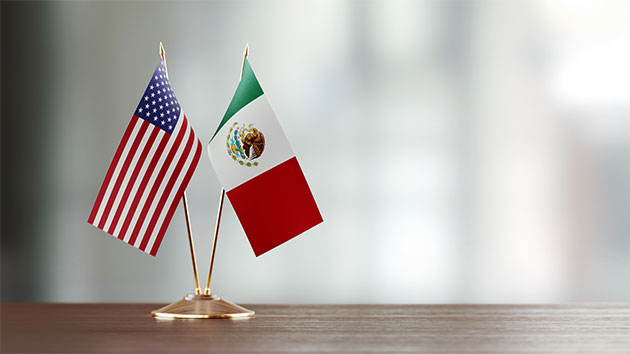
iStock/MicroStockHub
 iStock/MicroStockHub(WASHINGTON) — President Donald Trump on Monday claimed that there is another, secret component to the migration deal with Mexico that will be revealed “in the not too distant future,” but Mexico’s foreign minister contradicted him.
iStock/MicroStockHub(WASHINGTON) — President Donald Trump on Monday claimed that there is another, secret component to the migration deal with Mexico that will be revealed “in the not too distant future,” but Mexico’s foreign minister contradicted him.
“We have fully signed and documented another very important part of the Immigration and Security deal with Mexico, one that the U.S. has been asking about getting for many years. It will be revealed in the not too distant future and will need a vote by Mexico’s Legislative body” the president tweeted. “We do not anticipate a problem with the vote but, if for any reason the approval is not forthcoming, Tariffs will be reinstated!”
We have fully signed and documented another very important part of the Immigration and Security deal with Mexico, one that the U.S. has been asking about getting for many years. It will be revealed in the not too distant future and will need a vote by Mexico’s Legislative body!..
— Donald J. Trump (@realDonaldTrump) June 10, 2019
But Mexico’s Foreign Affairs Minister Marcelo Ebrard on Monday said there were no undisclosed parts of the U.S.- Mexico deal.
“Outside of what I have just explained, there is no agreement,” Ebrard said at a morning press conference. “It is an immigration agreement, not a commercial one.”
The White House did not respond to a question about what the president made reference to, and neither Trump nor his counselor Kellyanne Conway would say during television interviews on Monday morning what undisclosed terms were part of the agreement.
“We purposely said we wouldn’t mention it for a little while. It’s going to be brought up because it has to be brought by their legislative body,” Trump said during an impromptu, unplanned interview on CNBC. “But most people know that answer, Joe. And it’s another very powerful tool in addition to the very powerful tools we got.”
He threatened tariffs on Mexico if its legislature doesn’t ratify the unnamed part of the agreement.
The president’s unexpected interview came after he decided to call into the show and offer up his response to Vice President of the U.S. Chamber of Commerce Myron Brilliant’s criticism of using tariffs as a negotiating tactic. The president called his use of tariffs to strike a deal a “beautiful thing.”
On Friday night, after days of talks between U.S. and Mexican leaders, a joint declaration was reached to curb the record number of migrants crossing the southern border. Mexico agreed to deploy its National Guard throughout Mexico to crack down on human smuggling and trafficking, and expand the implementation of existing “Migrant Protection Protocols,” a policy that requires migrants to remain in Mexico while their asylum request in the U.S. is adjudicated.
During negotiations the United States also wanted Mexico to agree to a “safe third country” agreement, where asylum seekers would be granted asylum in Mexico and be unable to claim asylum in the US, but Mexico ultimately got the U.S. to back off that request.
Mexico’s Ebrard referred to Mexico’s resistance to that demand over the weekend and said that the United States began with demands for “drastic measures” but they were ultimately able to reach “middle ground.”
The agreement also did not include any promises from Mexico to increase agricultural purchases, which the president tweeted about on Saturday morning.
The president spent the weekend and Monday morning defending the U.S.-Mexico agreement on Twitter against criticisms the deal does not include anything new. The New York Times reported that former Department of Homeland Security Secretary Kirstjen Nielsen and Mexico’s Interior Secretary Olga Sanchez had already agreed to deploy Mexican national guard troops to the border during an unreported March meeting in Miami.
Trump balked at the idea nothing was new and called the report “false and untrue.”
But Acting DHS Sec. Kevin McAleenan said on Fox News Sunday defended the agreement and claimed that yes, it actually is all “new.”
“All of it is new. I mean, we’ve heard commitments before from Mexico to do more on their southern border. The last time they deployed down there is about four or 500 officers,” McAleenan said of the 6,000 troops commitment from Mexico.
“This is the first time we’ve heard anything like this kind of number of law enforcement being deployed in Mexico to address migrations. Not just at the southern border but also on transportation routes to the northern border and in coordinated patrols in key areas around our southwest border.”
The claim was contradicted on Monday by Mexico’s foreign minister, who said that Mexico was already planning to send 6,000 National Guard troops to the Mexico-Guatemala border but that, as a result of the deal with the U.S. announced Friday, that deployment is now happening faster.
The Mexicans were also hesitant about the president’s claim that Mexico agreed to a significant increase in Mexican agricultural purchases.
“I want to be quite clear – there is no agreement of any kind that has not been made known,” Ebrard said on Monday. “We do not have a specific agreement on products.”
The White House and USDA did not respond to a request for comment, however a senior administration official told ABC News there was a “verbal” agreement, although no specifics were discussed.
Some critics said the deal was nothing more than a way for the president to save face after threatening unpopular tariffs against Mexico.
“These are agreements that Mexico had already made, in some cases months ago,” Democratic presidential candidate Beto O’Rourke told ABC News’ “This Week.”
Copyright © 2019, ABC Radio. All rights reserved.